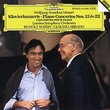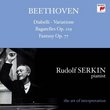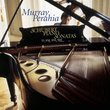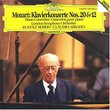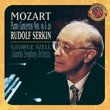| All Artists: Wolfgang Amadeus Mozart, Alexander Schneider, Columbia Symphony Orchestra, Rudolf Serkin Title: Mozart: Piano Concerto No. 23; Piano Concerto No. 27 Members Wishing: 0 Total Copies: 0 Label: Sony/Bmg Int'l Original Release Date: 1/1/2003 Re-Release Date: 9/1/2003 Album Type: Import, Original recording remastered Genre: Classical Styles: Chamber Music, Forms & Genres, Concertos, Historical Periods, Classical (c.1770-1830), Instruments, Keyboard Number of Discs: 1 SwapaCD Credits: 1 |
Search - Wolfgang Amadeus Mozart, Alexander Schneider, Columbia Symphony Orchestra :: Mozart: Piano Concerto No. 23; Piano Concerto No. 27
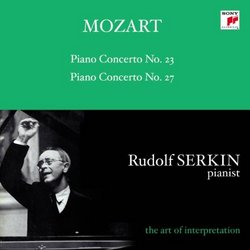 | Wolfgang Amadeus Mozart, Alexander Schneider, Columbia Symphony Orchestra Mozart: Piano Concerto No. 23; Piano Concerto No. 27 Genre: Classical
|
Larger Image |
CD DetailsSimilar CDs |
CD ReviewsALLA BREVE DAVID BRYSON | Glossop Derbyshire England | 03/20/2004 (4 out of 5 stars) "There never seem to be many really great Mozart players in any given generation, and Serkin has left us very little of his own Mozart except for the concertos. On this disc the Columbia S O is really the great Cleveland under another name for reasons unknown to me. The quality of the string section needs no advertising, but I would have preferred rather fewer of them. To go along with the orchestral forces Serkin correspondingly uses what sounds like an 8-foot grand, and admirably though he scales down his tone I would have liked a smaller instrument too. The recorded tone is not bad, although third-millennium quality is not to be expected. None of this, however, would have prevented me from giving 5 stars to this disc. My problem is with the slow movement of K595.In K488 Serkin never took the first movement particularly fast, although he is a bit faster here than in his swansong series with Abbado and the LSO. Everything is basically right here, it seems to me, given some slight reservations as above about the scale of the forces deployed. The slow movement in particular has a depthless sadness, and the finale is full of life, alertness and rhythmic spring. Among other versions from artists of the same generation I should draw attention to those by Solomon and Curzon. Curzon is exquisite - delicate, immaculate and shapely. I am not one of Solomon's particular admirers as a rule, but in this concerto his special and rather introverted manner seems to me extremely effective and original. There is even an account by Michelangeli, a live performance with Giulini in 1951, which I have obtained out of curiosity, but the recording makes it impossible to recommend except to other collectors of his work.In K595 the outer movements are again admirable. In the slow movement there is enormous depth of feeling and sensitivity in the phrasing, but for me it is simply far too slow. Serkin of all players should have known better. At his American debut with Toscanini in 1936 they gave this very concerto, and at the rehearsal Serkin queried whether Toscanini's beat was not too fast. Toscanini was firm about it - Mozart indicated an alla breve tempo [i.e. 2 beats, not 4, to the bar] whatever the printed scores had, and he told Serkin to check this out at his next opportunity. Serkin did so, and Toscanini was right. Also, the tempo direction is `larghetto'. For me the `marker' for this indication is the slow movement of Beethoven's second symphony. Nobody ever seems inclined to drag that, but the tempo here in this Mozart is something more like adagio molto. Whether there is still any genuine dispute regarding the alla breve I don't know, but the last score I saw had it right. The other performance I have of this concerto is a really lovely one by Brendel with the Vienna Staatsoper orchestra, and it would be my own choice in preference. The recording is a little backward, but the style is more to scale and the tempo in the middle movement is more reasonable to my way of thinking. That is my only real difficulty with a notable disc which I would want anyway for the sake of getting my hands on anything I can from this great player. It may be that you do not share my misgivings over the tempo in question in any case."
|

 Track Listings (6) - Disc #1
Track Listings (6) - Disc #1